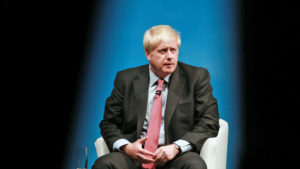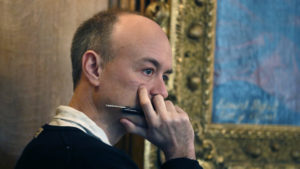These days, with Partygate refusing to go quietly, there’s increasing attention paid to Boris Johnson’s incapacity to keep a story straight, not to mention his constant prevarication about what conservatism in practice should look like: lockdowns or wild parties? Or both? Yet the evidence has always been there. In particular, in the area of what are popularly known as LGBT+ rights, there’s been a degree of historical variation in his attitudes at which even his ex-wives might marvel. Over the course of his political trajectory, the symbolic gestures have been plentiful, but without any sense of coherence or underlying conviction.
For Home Counties reactionaries, there have been absences from key votes on gay equality and gay adoption, and scepticism expressed in print about gay marriage: “If gay marriage was ok — and I was uncertain on the issue — then I saw no reason in principle why a union should not be consecrated between three men, as well as two men; or indeed three men and a dog.” There are also suggestions that some in Johnson’s camp falsely represented a rival for his Henley seat as gay, in order to present Johnson as the more palatable candidate.
For the liberal metrosexual Londoner, meanwhile, there was eventual backing for gay marriage, highly publicised appearances at Stonewall award ceremony presentations, the return of the rainbow flag above the Foreign Office after a ban by Philip Hammond, and the frankly terrifying sight of Johnson in a pink Stetson at a Pride parade. And for the ever-present peanut gallery in Johnson’s head, there have been plenty of gags on the way to some other political target: “tank-topped bum boys” as a means of lampooning Peter Mandelson in 1998, or describing Polly Toynbee in 2007 as “the defender and friend of… every gay and lesbian outreach worker, every clipboard-toter and pen-pusher and form-filler whose function has been generated by mindless regulation”.
For most of his career, these lurches in attitude have occupied roughly distinct phases with occasional overlap, depending on who he was trying hardest to impress at the time. The inconsistency has perhaps been somewhat masked by Johnson’s capacity to induce selective amnesia in those susceptible to him. Recently, though, the wild haymaking on LGBT+ issues has become more obvious and more incoherent — forced into the light because of the surrounding political fuss about gender identity policies and their effects.
For when properly understood — as most MPs still do not — this controversy exposes a tension between, on the one hand, the goals of official organisations claiming to speak for gays and lesbians, and on the other the interests of many gays and lesbians as they themselves conceive of them. And clearly, Johnson — and perhaps the Tory party more generally — does not know which way to jump.
In this antagonistic context, the usual lazy progressive gestures from politicians are not going to get the crowd-pleasing results they once might have done. Put a rainbow flag up on a government building and the grassroots automatically see it as captured by Stonewall — as indeed, it often is. A politician may parrot what looks like a safe and indeed utterly vacuous tautology on Twitter — “trans rights are human rights”, say, or “love means love” — and yet the grassroots still will respond furiously, not because they disagree with the sentiment, but because they know exactly which organisation told the politician to express it and why.
Into this conflict, Johnson appears to have wandered either unaware or indifferent, banking on his usual strategy of being all things to all Tory voters and hoping that nobody notices the mismatch. For instance, at the beginning of October last year, he attended a Stonewall-organised event at the Conservative Party conference, listening to his wife give a supportive on-message speech in familiar Stonewall-approved jargon, and waxing expansively, if not entirely accurately, that “being LGBT+” is “still a crime in 71 countries” and in 11 countries is “punishable by death, just because of who you love” (er.. Carrie, I think you might mean homosexual people). A mere two weeks later he was publicly backing the LGB Alliance — an organisation of which I was then a trustee, whose aim is to protect the rights of same sex-attracted people, specifically. The fact that the aims of these two organisations are diametrically opposed to one another seemed to pass him by.
Since then, his government has lurched abruptly from, first, pushing for a Stonewall-favoured ban on “conversion therapy” for non-standard gender identities — a ban which, experts feared, would criminalise talking therapies for young people confused about their gender identity, including many gay and lesbian youths — to backtracking on the proposal, thereby pleasing practically nobody in the process, and precipitating the collapse of a flagship international LGBT+ conference the government was supposed to be hosting. And at no point during this turbulent period has Johnson indicated any real grasp on why any of this might matter, or moved much beyond spouting with great enthusiasm whatever script an adviser just hastily handed him.
And yet I think there is perhaps a deeper and more interesting problem here than the short-term priorities of career politicians, bad as that is for politics generally. For the cynical prevarication of their leader is at least partly facilitated by a genuine lack of clarity at the conceptual level about how modern conservatism should view gay and lesbian people, and their political interests.
On the one hand, there are the sexual libertarians in the Tory party, prioritising personal freedom above all else. In this, they take themselves to be broadly in line with liberalism generally, though perhaps unlike them, most sensible liberals are willing at least to have a conversation about what happens when the desired freedoms of particular individuals or groups clash. For sexual libertarians, there is a clear and simple line to be taken on sex and gender if at all possible: let the people be free, to sleep with who they want, wear what they want, do what they want to their bodies surgically or medically, and go where they want to in physical and social space.
Their stance seems well represented by MP Crispin Blunt, who recently wrote in favour of the conversion therapy ban for gender identity, and against his own government, by connecting the issue with freedom: “We have no choice but to work to sustain our personal freedoms, to continue to make the case that these freedoms are good for all, economically and socially, in our societies and help those who languish under discrimination and criminalisation win their freedom to the benefit of all”. The present iteration of Stonewall bureaucrats apparently agrees, broadly speaking, though they seem completely unwilling to examine how the constant drive to legislate to protect the freedoms of one particular group (e.g. trans people) might curtail freedoms for those in other groups (e.g. gays and lesbians, or women).
On the other hand, there are those conservatives more concerned with preserving social order and building a cohesive society than with pursuing personal freedom. Whether these self-describe as One Nation Conservatives or Red Tories or something else, they stress continuity with past traditions and the importance of producing laws and policies grounded in people’s existing values, rather than trying to impose certain elite values only from above.
They also tend to be concerned with preserving traditional family structures in the name of social stability. Though they may not admit it, for this kind of conservative, gays and lesbians — and indeed trans people too — pose a philosophical and political problem, because it’s unclear on what grounds their specific interests should be promoted, over and above the provision of basic human rights. Aside from liberal appeals to personal freedom, there is no pre-existing cultural norm in the UK that you might appeal to in order to justify two women marrying, or two men adopting a child.
On the contrary, what you will tend to find, and particularly in more cohesive traditional communities, is strong suspicion of any such arrangements, and even disgust and fear. And in fact, it’s worse than this, because from the perspective of the traditionalist, appealing to personal freedom in order to justify gay and lesbian rights is likely to open the door to the destruction of other traditional social values and norms in the name of freedom too. And in that, they in fact seem to be right. Put comically, this was presumably Johnson’s point when he discussed the perceived slippery slope from marrying two men to marrying three men and a dog.
This tension within conservatism is rarely confronted in this context — the temptation is often just to stick a rainbow on it and cross the fingers — but I think it is felt keenly by some lesbians and gays left in the middle, between crazy liberalising ambitions of others on their behalf, and the disapproving stares of traditionalists. The modern Left can’t help them either, because it too contains within itself a version of this tension — between the Left-liberals, focused on breaking down traditional cultural norms in the name of progress, and the older socialist Left, comfortable with traditional family structures and so uncomfortable with homosexuality.
At the grassroots, many gays and lesbians can see clearly what damage is being done by sexual libertarians in the name of freedom around sex and gender identity: medicalising gay children, ruining women’s sport, and bringing inappropriately sexualised materials into schools, for instance. But equally, gay people can’t take solace in pretending that they seamlessly fit into a mostly heterosexual society, even when they try very hard to do so — or that they don’t need a positive political argument to justify their place there. And since they do need an argument, the argument from personal freedom looks to many like the best they’ve got.
A different possibility is to mimic an idealised form of heterosexual lifestyle, differently filled out — that is, to go for the marriage and the kids in a stable home, but with same-sex parents. But equally, there’s no overcoming the difference homosexuality makes to the traditional possibilities of reproduction. And when gays and lesbians attempt to get what they need from the opposite sex in order to “fit in” in this way, whether via sperm donation or surrogacy or something else, they quickly run up against a confrontation with tradition once again. Here too, they need an argument to justify themselves, and here too, the appeal to personal freedom comes calling once again as an apparently compelling option.
Stuck between dangerously unconstrained freedom on the one hand, and dangerously hostile tradition on the other, what the situation of lesbians and gays arguably exposes is the deep ideological fault-lines within modern British conservatism — and even within modern politics generally — hiding within plain sight all along. No wonder the politicians stick to meaninglessly trite mantras. Trans rights are human rights. Love is love.
Disclaimer
Some of the posts we share are controversial and we do not necessarily agree with them in the whole extend. Sometimes we agree with the content or part of it but we do not agree with the narration or language. Nevertheless we find them somehow interesting, valuable and/or informative or we share them, because we strongly believe in freedom of speech, free press and journalism. We strongly encourage you to have a critical approach to all the content, do your own research and analysis to build your own opinion.
We would be glad to have your feedback.
Source: UnHerd Read the original article here: https://unherd.com





